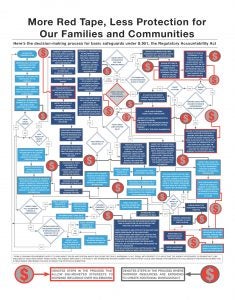Richard Denison, Ph.D., is a Lead Senior Scientist.
I noted in a recent post EDF’s grave concerns about the Regulatory Accountability Act (RAA), which passed the House on January 11. A shorter but still very concerning version of it may soon be introduced in the Senate, modeled on last Congress’ Senate version of RAA. This bill would add dozens of burdensome and time-consuming hurdles to the rulemaking process, effectively crippling it and eliminating the health and safety protections rules are intended to provide. To get a feel for all of the requirements, see this dizzying RAA flow chart.
Among other things, the RAA would mandate multiple rounds of cost and impact analysis of a potentially unlimited number of regulatory alternatives; require that all major rules go through an entirely new pre-proposal step, adding months if not longer to the rulemaking process; generally require that agencies choose the lowest-cost regulatory option, regardless of whether or not it is the best option or even sufficient to meet a law’s requirements; and require lengthy and resource-intensive public hearings on many rules. To top all this off, the bill would require an agency to finalize a proposed rule within 2 years (subject to a 1-year extension) – a timeframe almost impossible to meet now without all of the additional requirements the Act would impose; if that deadline was not met, the agency would have to start over.
There is extreme irony in the advancement of the RAA in this Congress: Just last June, both houses of Congress passed – with overwhelming bipartisan support – major reforms to the obsolete Toxic Substances Control Act (TSCA). The Lautenberg Act removed from the original TSCA several major constraints on the rulemaking process that had so tied the hands of the Environmental Protection Agency (EPA) that it could not even restrict asbestos, a known carcinogen that kills more than 10,000 Americans every year. There was widespread agreement among industry and other stakeholders that those provisions of the old TSCA were detrimental or unnecessary to an efficient regulatory system and were undermining public and market confidence in the federal chemical safety system – not to mention failing to protect public health.
So here’s the irony: The RAA would impose those same knot-tying strictures that the Lautenberg Act just got rid of – and expand them to rulemakings undertaken by any federal agency. Let’s look at some of these crippling requirements, based on last Congress’s Senate version of the RAA: Read More »










